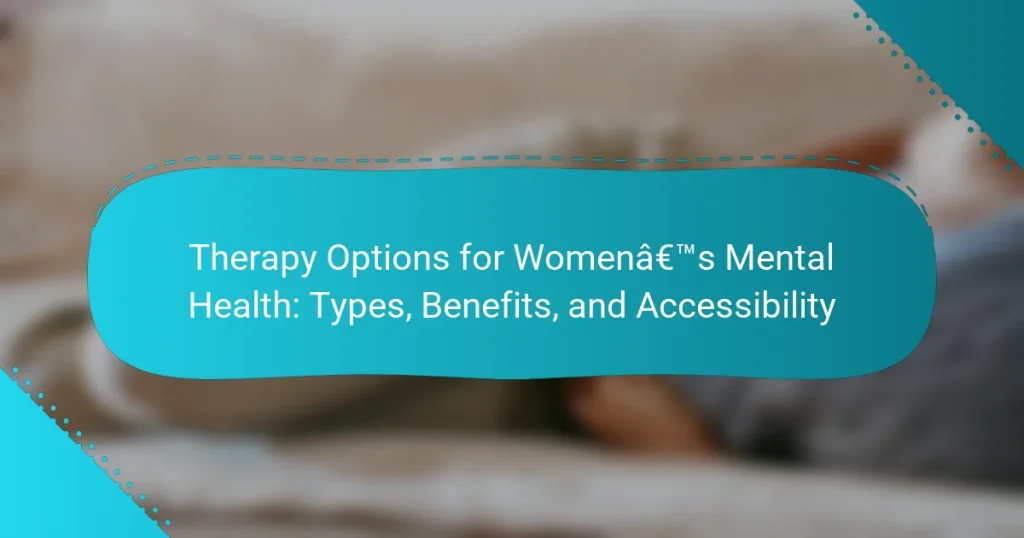Access to effective therapy options is crucial for women’s mental health. This article explores various types of therapy, including cognitive-behavioral therapy and mindfulness-based therapy, and their specific benefits. It also examines accessibility challenges, such as geographical location and economic factors, while highlighting unique approaches like trauma-informed care and expressive arts therapies. Understanding these elements can help women make informed choices about their mental health care.
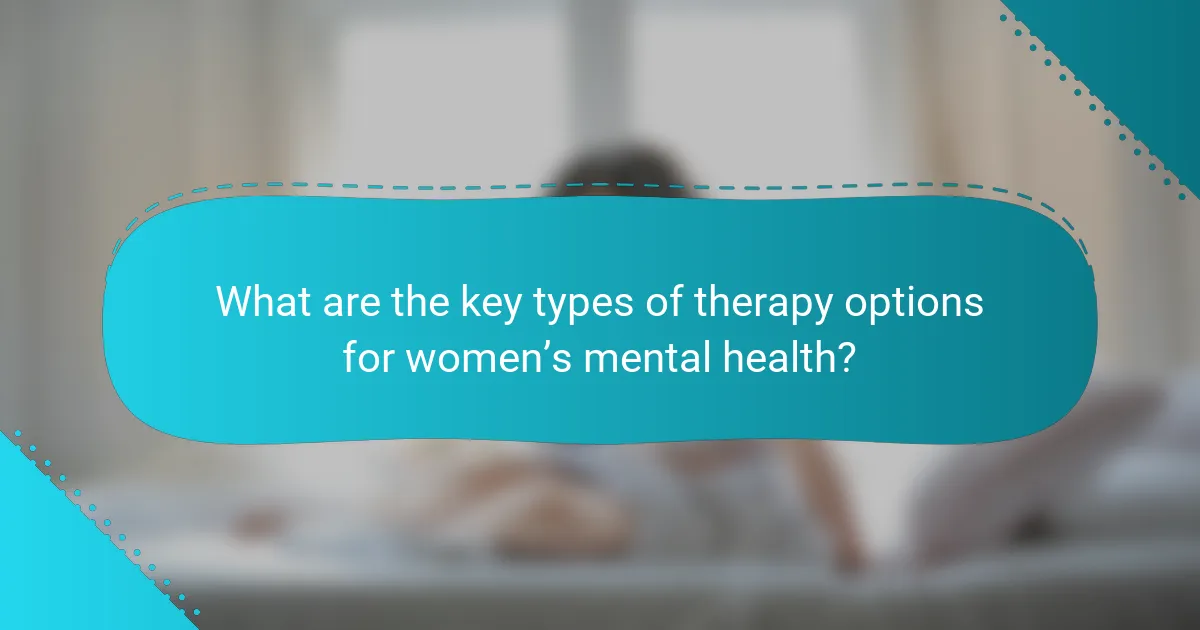
What are the key types of therapy options for women’s mental health?
Therapy options for women’s mental health include cognitive-behavioral therapy, dialectical behavior therapy, mindfulness-based therapy, and group therapy. Each type addresses unique challenges and offers specific benefits.
Cognitive-behavioral therapy (CBT) focuses on changing negative thought patterns, resulting in improved mood and behaviour. Dialectical behavior therapy (DBT) emphasizes emotional regulation and interpersonal effectiveness, helping women manage intense emotions. Mindfulness-based therapy promotes awareness and acceptance, reducing anxiety and stress. Group therapy provides support through shared experiences, fostering connection and understanding.
Accessibility varies based on location and resources. Many therapists offer online sessions, increasing reach for women in remote areas. Community health centres often provide affordable options, ensuring more women can access these essential mental health services.
How do individual therapy sessions work?
Individual therapy sessions provide personalized support tailored to women’s mental health needs. Typically, these sessions involve a one-on-one interaction with a licensed therapist, focusing on specific challenges such as anxiety, depression, or trauma.
During sessions, clients explore their thoughts and feelings in a safe environment. This process encourages self-discovery and coping strategies. Research indicates that individual therapy can lead to significant improvements in emotional well-being and overall mental health.
Accessibility varies based on location and insurance coverage, but many therapists offer flexible scheduling and online options. This adaptability enhances access for women seeking mental health support.
What is group therapy and how does it benefit women?
Group therapy provides women a supportive environment to share experiences and gain insights. It fosters connection, reduces feelings of isolation, and enhances coping strategies. Research shows that women in group therapy report improved mental health outcomes, such as increased self-esteem and reduced anxiety. The collaborative nature allows participants to learn from each other, creating a unique dynamic that promotes personal growth and healing.
What role does family therapy play in women’s mental health?
Family therapy significantly enhances women’s mental health by fostering communication and support. It addresses relational dynamics that impact emotional well-being. This therapy option helps women process trauma, improve self-esteem, and develop coping strategies. Research indicates that women in family therapy report higher satisfaction and reduced symptoms of anxiety and depression. By involving family members, therapy creates a supportive environment, which is crucial for healing.
How effective is cognitive-behavioral therapy (CBT) for women?
Cognitive-behavioral therapy (CBT) is highly effective for women, addressing various mental health issues. Studies show that CBT significantly reduces symptoms of depression and anxiety, with a success rate of approximately 60-70%. This therapy empowers women by providing practical skills to manage their thoughts and behaviours. Additionally, CBT is accessible, often available through online platforms, enhancing its reach and convenience for women seeking mental health support.
What unique approaches does dialectical behavior therapy (DBT) offer?
Dialectical behavior therapy (DBT) offers unique approaches such as mindfulness, emotional regulation, distress tolerance, and interpersonal effectiveness. These skills empower women to manage emotions and improve relationships effectively. DBT’s focus on acceptance and change sets it apart from traditional therapies, enhancing accessibility and engagement for women’s mental health.
How does art therapy support women’s mental health?
Art therapy effectively supports women’s mental health by providing a creative outlet for expression and healing. It enhances emotional well-being, reduces anxiety, and fosters self-discovery. This therapeutic approach allows women to explore feelings through art, promoting connection and resilience. Research shows that art therapy can lead to significant improvements in mental health outcomes, making it a valuable resource for women seeking support.
What is the significance of play therapy for women?
Play therapy significantly benefits women by fostering emotional expression and healing. It provides a safe space for women to explore feelings, reduce anxiety, and improve self-esteem. This therapeutic approach can be particularly effective for trauma recovery, as it allows for non-verbal communication of complex emotions. The unique attribute of play therapy is its adaptability to various age groups and backgrounds, making it accessible for diverse women seeking mental health support.
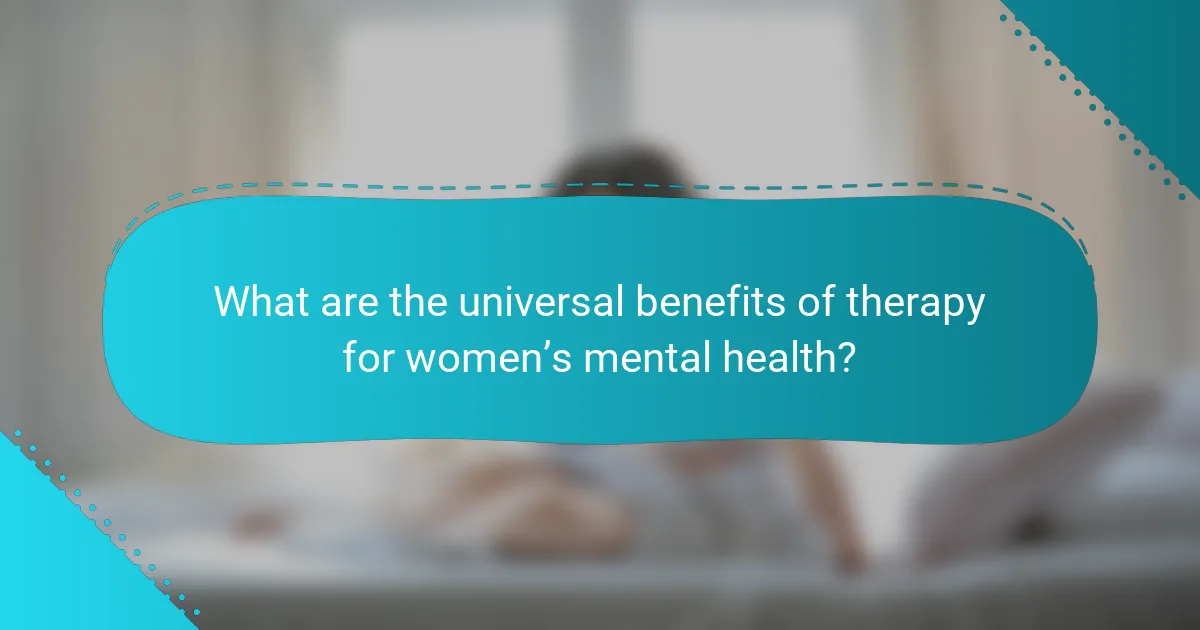
What are the universal benefits of therapy for women’s mental health?
Therapy offers numerous benefits for women’s mental health, including improved emotional regulation, enhanced self-esteem, and better coping strategies. It provides a safe space for expression, leading to reduced symptoms of anxiety and depression. Therapy options like cognitive-behavioral therapy and group therapy are particularly effective. Accessibility has improved, with online platforms expanding reach.
How can therapy improve emotional well-being?
Therapy significantly enhances emotional well-being by providing support, coping strategies, and a safe space for self-exploration. It helps individuals process emotions, reduce anxiety, and improve self-esteem. Research indicates that therapy can lead to a 50% improvement in mental health symptoms within a few months. Various therapy types, such as cognitive-behavioral therapy and mindfulness-based therapy, cater specifically to women’s mental health needs. Accessibility remains crucial, with online therapy options increasing availability and reducing stigma.
What impact does therapy have on stress management?
Therapy significantly improves stress management by providing coping strategies and emotional support. Various therapy options, such as cognitive behavioural therapy and mindfulness-based therapy, help women process stressors effectively. Research shows that therapy can reduce stress levels by up to 50%, enhancing overall mental well-being. Accessibility to these therapies is increasing, with online options making them more available to women seeking support.
How does therapy enhance self-esteem in women?
Therapy significantly enhances self-esteem in women by providing supportive environments for self-exploration and personal growth. It offers tools for coping with negative self-perceptions and promotes positive self-talk. Cognitive Behavioural Therapy (CBT) is particularly effective, helping women identify and challenge harmful thought patterns. As a result, many women experience improved self-worth and confidence. Access to various therapy options, including online platforms, increases availability and convenience, making mental health support more accessible.
What are the long-term benefits of therapy for women?
Long-term therapy benefits for women include improved emotional regulation, enhanced coping skills, and increased self-awareness. Over time, women often experience reduced anxiety and depression symptoms, leading to better relationships and overall life satisfaction. Studies indicate that women who engage in therapy report higher resilience and a greater sense of empowerment in their lives. These benefits contribute to a healthier mental state and improved quality of life.
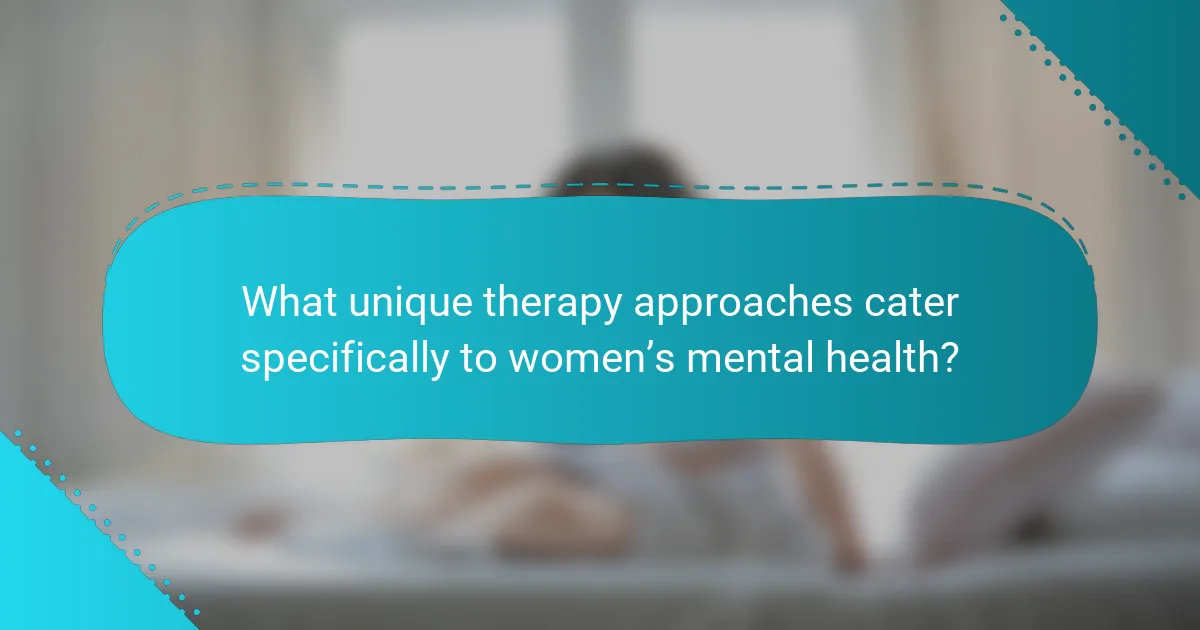
What unique therapy approaches cater specifically to women’s mental health?
Unique therapy approaches for women’s mental health include trauma-informed care, mindfulness-based therapies, and expressive arts therapies. These methods address specific challenges women face, such as trauma, anxiety, and self-esteem issues. Trauma-informed care recognizes the impact of past trauma, fostering a safe environment. Mindfulness-based therapies enhance emotional regulation and reduce stress. Expressive arts therapies encourage self-expression, promoting healing through creativity. Accessibility varies, with many practitioners offering online sessions, making these therapies more available to women seeking support.
How does feminist therapy address women’s specific issues?
Feminist therapy specifically addresses women’s issues by focusing on the societal and cultural factors that impact mental health. It emphasizes empowerment, gender equality, and the importance of context in understanding a woman’s experiences. This approach recognizes the unique challenges women face, such as sexism and gender-based violence, and promotes resilience through community and support networks. By validating women’s experiences and encouraging self-advocacy, feminist therapy fosters a sense of agency and identity.
What is the role of trauma-informed care in women’s therapy?
Trauma-informed care plays a crucial role in women’s therapy by prioritizing safety and empowerment. It recognizes the impact of trauma on mental health and integrates this understanding into therapeutic practices. This approach fosters trust, promotes resilience, and enhances treatment efficacy. Women benefit from personalized care that acknowledges their unique experiences and needs, leading to improved mental health outcomes. Research indicates that trauma-informed therapies can reduce symptoms of anxiety, depression, and PTSD, making them essential in women’s mental health services.
How do culturally sensitive therapies benefit women?
Culturally sensitive therapies benefit women by addressing their unique experiences and backgrounds. These therapies foster trust and understanding, leading to improved mental health outcomes. By incorporating cultural values and practices, therapists can create personalized treatment plans that resonate deeply with women. This approach enhances engagement and reduces stigma, making therapy more accessible and effective for diverse populations.
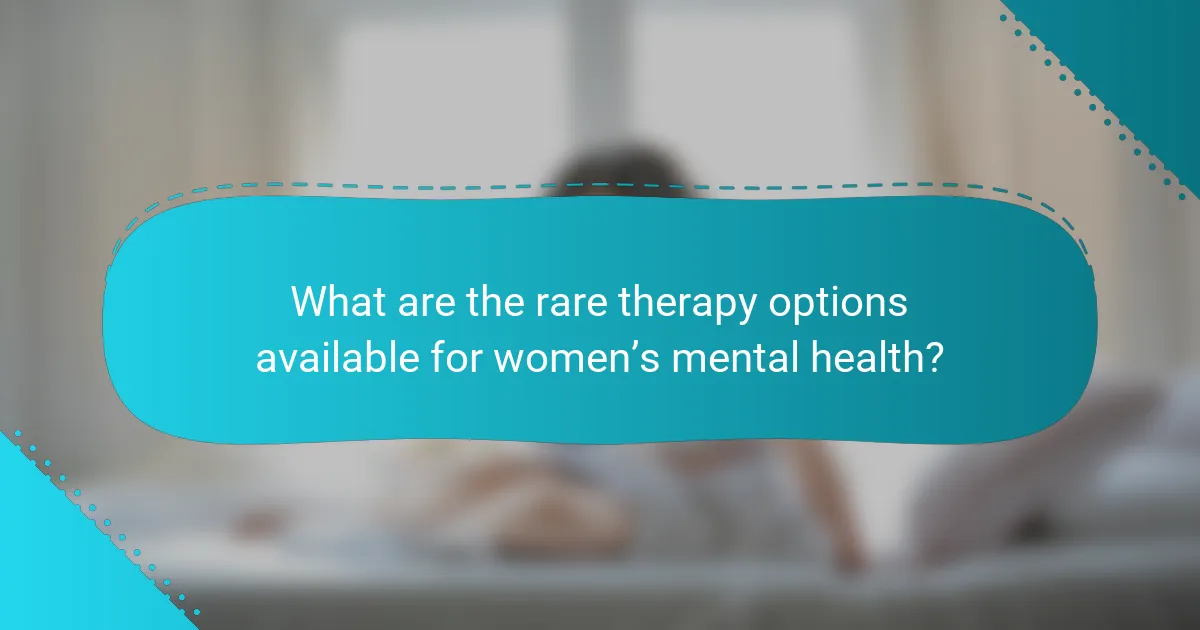
What are the rare therapy options available for women’s mental health?
Rare therapy options for women’s mental health include art therapy, equine therapy, and nature therapy. These approaches focus on unique aspects of healing through creative expression, animal interaction, and natural environments. Art therapy allows women to explore emotions through artistic mediums, fostering self-discovery. Equine therapy involves interactions with horses to build trust and improve emotional regulation. Nature therapy emphasizes the mental health benefits of spending time in natural settings, promoting relaxation and reducing anxiety. Each of these therapies offers distinct benefits and is accessible through specialized practitioners.
How does equine therapy support women’s mental health?
Equine therapy supports women’s mental health by providing emotional healing through interactions with horses. This therapy enhances self-esteem and reduces anxiety, fostering a sense of trust and connection. Studies show that equine therapy can significantly lower symptoms of depression and PTSD in women. The unique bond formed with horses offers a non-judgmental space, promoting personal growth and resilience.
What is the impact of adventure therapy on women’s mental health?
Adventure therapy significantly enhances women’s mental health by promoting emotional resilience and self-discovery. This therapeutic approach allows women to engage in outdoor activities, fostering a sense of empowerment and community. Research indicates that participants often experience reduced anxiety and improved mood. Unique attributes of adventure therapy include its experiential learning aspect, which differentiates it from traditional therapy. Accessibility remains a challenge, but many programs are expanding to meet the needs of diverse populations.
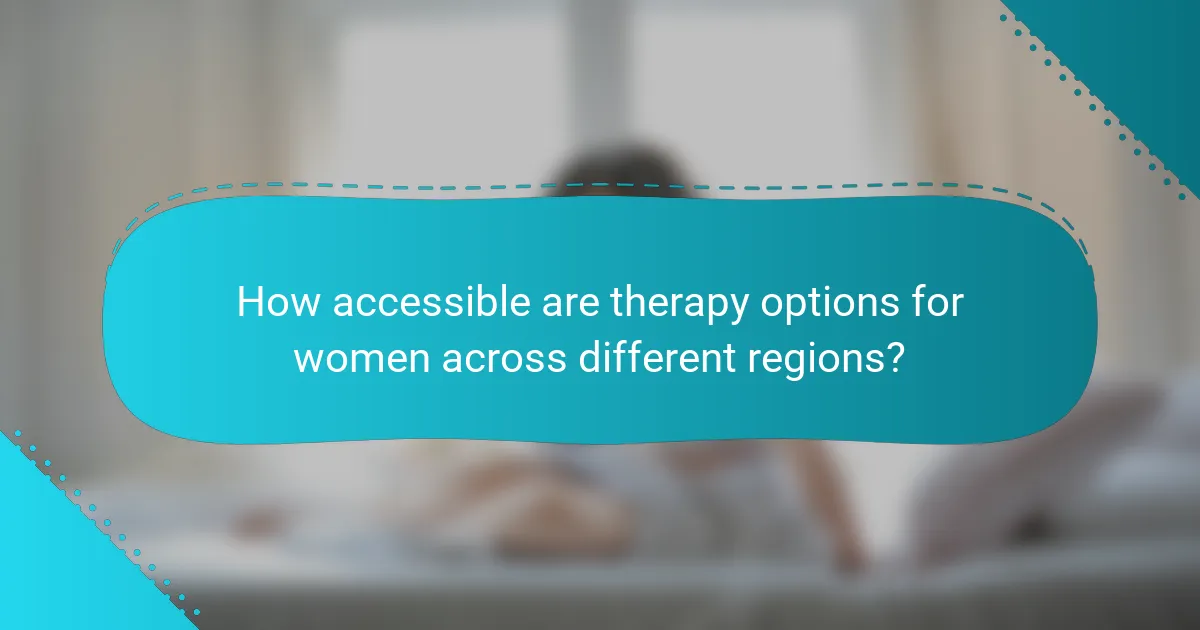
How accessible are therapy options for women across different regions?
Therapy options for women vary significantly in accessibility across regions. In urban areas, services like cognitive behavioural therapy (CBT) and group therapy are often readily available, while rural regions may have limited access to specialized providers.
Barriers such as cost, transportation, and cultural stigma can further impact accessibility. For instance, women in low-income areas may face challenges affording therapy, whereas those in higher-income regions might have better insurance coverage and more options.
Teletherapy has emerged as a unique solution, increasing access for women in remote locations. This method allows for flexible scheduling and reduces travel time.
Overall, the accessibility of therapy options for women is influenced by geographical location, economic factors, and the availability of digital services.
What barriers do women face in accessing therapy?
Women face several barriers in accessing therapy, including financial constraints, stigma, and lack of awareness. Financial limitations often arise from high therapy costs and inadequate insurance coverage. Stigma surrounding mental health can discourage women from seeking help, as they may fear judgment or discrimination. Additionally, many women may not be aware of available therapy options or how to access them, leading to missed opportunities for support. Cultural factors may also play a role, as some women might feel that seeking therapy contradicts traditional values or beliefs.
How can teletherapy improve access to mental health services for women?
Teletherapy significantly enhances access to mental health services for women by removing geographical barriers and increasing convenience. Women can engage in therapy from their homes, which is especially beneficial for those with caregiving responsibilities or mobility issues. Studies indicate that teletherapy can lead to higher engagement and retention rates, as it offers flexible scheduling and reduces the stigma associated with seeking help. Furthermore, it provides access to a broader range of specialists, allowing women to find therapists who align with their unique needs and preferences.
What role do community organizations play in providing therapy?
Community organizations play a vital role in providing therapy by increasing accessibility and offering diverse support options. They often provide tailored programs that address women’s mental health needs, such as group therapy and workshops. These organizations can bridge gaps in traditional healthcare, ensuring that underserved populations receive essential mental health services. By fostering community connections, they create safe spaces for women to share experiences and seek help, enhancing overall well-being.
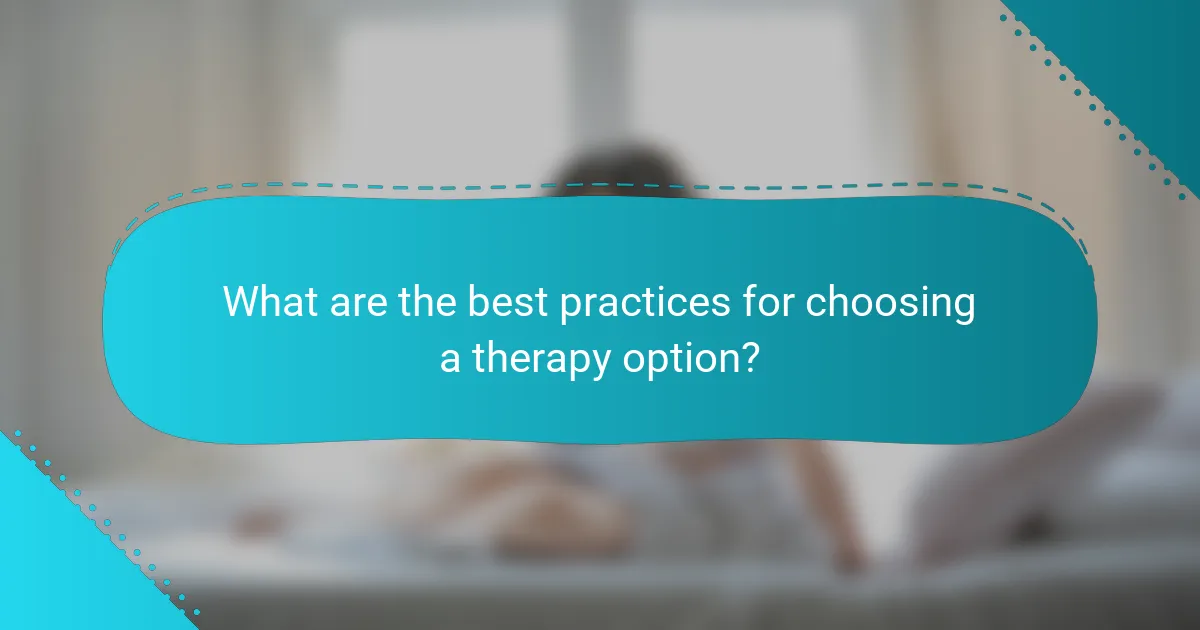
What are the best practices for choosing a therapy option?
To choose a therapy option effectively, consider the individual’s specific mental health needs, preferences, and accessibility. Evaluate different therapy types, such as cognitive-behavioral therapy or mindfulness-based therapy, based on their proven benefits for women’s mental health. Accessibility factors include location, cost, and availability of qualified practitioners. Additionally, ensure that the chosen therapy aligns with personal comfort and values, fostering a supportive therapeutic relationship.
How can women assess their mental health needs before seeking therapy?
Women can assess their mental health needs by reflecting on their emotions, behaviours, and daily challenges. Start by identifying symptoms like anxiety, depression, or stress. Consider keeping a journal to track feelings and triggers over time. Evaluate how these issues impact daily life, relationships, and overall well-being. Seeking feedback from trusted friends or family can provide additional perspectives. Finally, research therapy options that align with identified needs, such as cognitive behavioural therapy or mindfulness-based approaches.
What should women look for in a therapist?
Women should seek therapists who prioritize empathy, understanding, and specialized training in women’s mental health issues. Look for credentials that reflect expertise in areas such as trauma, reproductive health, or anxiety. Accessibility is vital; consider location, availability, and whether they accept insurance. Personal comfort with the therapist’s approach is crucial for effective therapy.
What common mistakes should women avoid when starting therapy?
Women should avoid common mistakes like not being open about their feelings, choosing the wrong therapist, or skipping sessions. These errors can hinder progress in therapy.
1. Lack of openness: Failing to share thoughts can prevent effective communication.
2. Selecting an incompatible therapist: Not all therapists match every individual’s needs.
3. Missing appointments: Regular attendance is crucial for building momentum.
4. Setting unrealistic expectations: Therapy is a process; quick fixes are rare.
5. Neglecting self-care: Personal well-being supports therapeutic progress.
How can women maximize the benefits of their therapy sessions?
Women can maximize the benefits of therapy sessions by actively participating, setting clear goals, and maintaining open communication with their therapist. Engaging in self-reflection before and after sessions enhances understanding of personal issues. Research shows that women who prepare questions and discuss their feelings often experience greater therapeutic outcomes. Regularly practicing techniques learned in therapy, such as mindfulness or journaling, reinforces progress. Additionally, seeking support from trusted friends or support groups can provide external encouragement, further enhancing the therapeutic experience.
